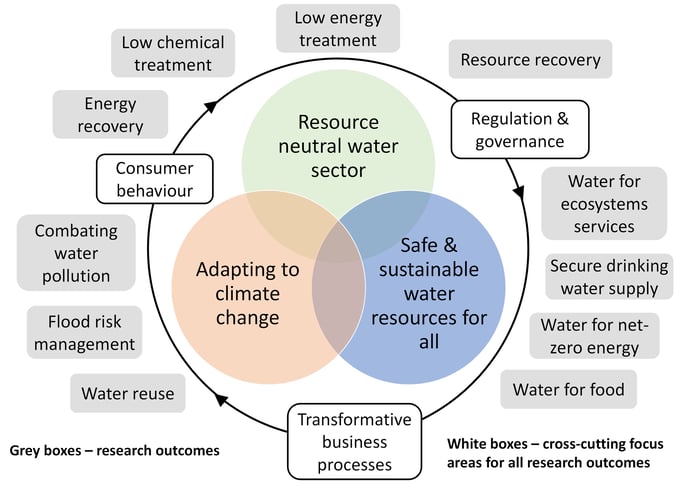Cranfield University’s PhD centre to lead on water security research
A collaboration of universities and industry groups to provide real-world skills and challenges to 60 PhD students whose research will aim to tackle water security issues in the country.
Safeguarding civic water resources
The UK government has awarded Cranfield University almost €9.5 million to support 60 PhD students whose research will help to tackle water security issues in the country.
Training will be delivered in the EPSRC Centre for Doctoral Training in Water Infrastructure and Resilience II (WIRe II), led by Peter Jarvis, professor of Water Science and Technology at Cranfield University’s Water Science Institute.

Funding for the centre comes from the UK’s Engineering and Physical Sciences Research Council (EPSRC), as part of a €1.7 billion government investment in engineering and physical sciences. The funding is creating 65 new Centres for Doctoral Training (CDTs).
Speaking to Aquatech Online, Jarvis said: “We are absolutely delighted to have secured further funding to support 60 more PhD students to help transform the management of our civic water resources, assets and services.
“With all the challenges being faced across our water systems, never has there been a more important time to focus research efforts on safeguarding civic water quality, alleviating the effects of climate change on our water resources, and advancing the sector carbon-neutrality ambitions.
While Cranfield will be leading the delivery programme, students will also enrol with Sheffield University and Newcastle University. The posts begin in October with 12 students enrolling each year, four at each university, bringing the total to 60.
Working with industry partners
The centre for research will bring together industry partners to collaborate in research and help develop students’ real-world skills:
“Working with a wide range of partner organisations, we are looking forward to delivering impactful outcomes that will help achieve stable, safe water delivery to customers and the return of water back to the environment for multiple beneficial purposes.”
“We have 12 water companies, including representation from all four nations of the UK as well as UK Water Industry Research Group (UKWIR), nine consultancies, OFWAT, Consumer Council for Water, as well as organisations working in the energy sector who have a water footprint – Sellafield Ltd and Mitsubishi Electric.”

How will students be trained to tackle real-world water problems?
Following an induction semester at Cranfield University, students will return to their university or industry partner to begin their research.
Much of the research will align with current research goals within the water sector, such as those being put forward through UKWIR Big Questions and the OFWAT Innovation Fund.
Jarvis added: “Throughout the programme, students are regularly brought back together for transferable and skills training to ensure graduates have the capacity to drive change in the sector and have a deep appreciation for the complexity and interconnectivity of people, water and critical civic infrastructure.”
Each July, the students will attend a Summer Challenge week based at an off-campus location and organised by each of the host universities in turn.
“The week will feature an assessed task that focuses on a relevant water infrastructure resilience challenge to be completed in cross-cohort groups, and a one-day conference,” Jarvis said.
“We will involve our partners and sponsors throughout the week through roles in the challenge and delivering inspirational keynote talks and workshops.”
Example challenges to be undertaken come from previous WIRe events, include:
• Managing a serious water quality incident, delivered in collaboration with the Drinking Water Inspectorate and Severn Trent; and
• Designing and delivering educational water science and engineering to Key Stage 2 and 3 students from socially disadvantaged backgrounds, using the Integrated Civil and Infrastructure Research Centre facilities at Sheffield.
During the one-day conference, students will either present a poster of their work or a full presentation depending on their stage of registration.
Supporting the next generation of researchers
Cranfield also received funding to develop a Centre for Doctoral Training to support research into net zero aviation and hydrogen.
Professor Leon Terry, pro-vice-chancellor for Research and Innovation at Cranfield University, welcomed the investment: “With our long-standing experience of working closely with industry on collaborative research, the new doctoral students are set to gain real-world experience and work with some of the UK’s leading experts in their fields.”
Professor Charlotte Deane, executive chair of the Engineering and Physical Sciences Research Council, part of UK Research and Innovation, which is funding the centre, said: “The Centres for Doctoral Training will help to prepare the next generation of researchers, specialists and industry experts across a wide range of sectors and industries.”
Related content
- Tech opportunities in the rise of reuse
- Ambitions for finding the ULTIMATE water symbiosis
- Water asset management: in need of a step-change?
Share your water technology stories with us
Do you have an innovation, research results or an other interesting topic you would like to share with the international water technology industry? The Aquatech website and social media channels are a great platform to showcase your stories!
Please contact our Sr Brand Marketing Manager Annelie Koomen.
Are you an Aquatech exhibitor?
Make sure you add your latest press releases to your Company Profile in the Exhibitor Portal for free exposure.
We promise never to send you spam and you can unsubscribe at any time!

